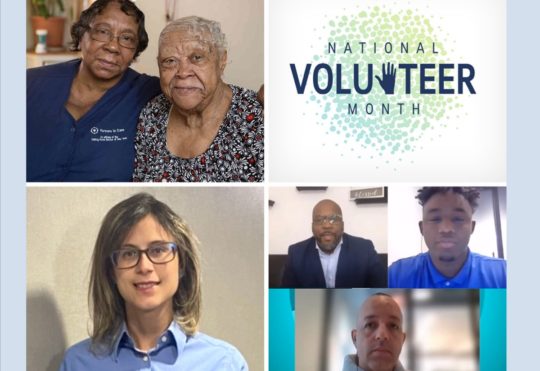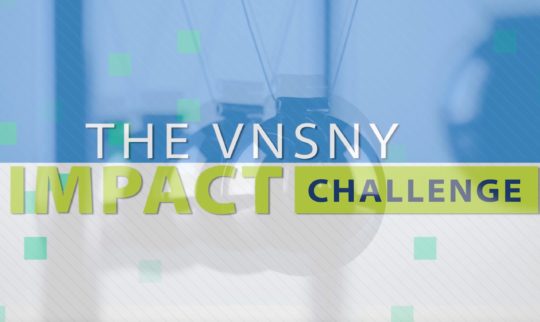Special Feature: Seven VNSNY Nurses From Across VNSNY Share Their Insights!
In honor of National Nurses Week, seven nurses working in different parts of VNSNY spoke to Frontline VNSNY about the challenges and rewards of their job. Here’s what they had to say:
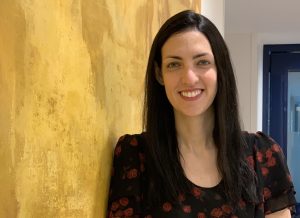 “I meet patients at their bedside close to discharge, at a time when many are very anxious about going home.”
“I meet patients at their bedside close to discharge, at a time when many are very anxious about going home.”
Michelle Schiffman, Home Care Consultant, VNSNY Home Care
“I’m based at Memorial Sloan Kettering Cancer Center, where I work as an intake nurse for VNSNY Home Care. I basically evaluate patients to determine whether they’re appropriate candidates for home care. If they are, I set up their home care services. I used to do bedside nursing at a hospital, and I was initially worried when I started here that I wouldn’t have as much patient contact as before—but I found that I most definitely do have meaningful interaction with patients. I meet them at their bedside close to discharge, at a time when many are very anxious about going home. They often have wounds and drains that have to be cared for, and many of them are still very sick, so they have lots of needs at home. I make sure that everything is taken care of, from insurance authorization to ensuring timely nursing and therapy visits—not to mention all those sudden, unexpected last-minute complications and issues that come up. It’s a big comfort to patients, knowing that everything will be set up and ready for them when they get home. Sometimes I have to manage their expectations, if their insurance won’t allow for as many visits as they’d hoped. But they usually tell me how amazing their home care nurses are, and I love that. It always makes my day!”
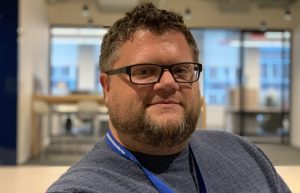 “Patients often tell me I’ve brought them a sense of peace.”
“Patients often tell me I’ve brought them a sense of peace.”
Jeffrey Halusic, Clinical Care Manager, Population Health
“My main role is to provide care management for patients who were discharged from a hospital or referred to VNSNY by a community physician. My fellow clinical care managers and I assess our patients via evidence-based tools and coordinate with their teams of care providers to make sure we’re utilizing all our services efficiently and effectively. We provide our patients and their caregivers with the support and guidance needed to help them better self-manage their health and wellness. It’s about prioritizing, all day long. Flexibility, open-mindedness, and the energy to follow through are key. Although my work is telephonic, I have a real connection with my patients. Many of them are feeling overwhelmed and anxious about trying to navigate the healthcare system. They often tell me that I’ve brought them a sense of peace, sometimes through a simple five-minute phone call. They also thank me for following up—for calling them back as I said I would, even if I don’t have an answer for them yet. Ours is a fledgling department, and we’re all learning as we go—new responsibilities, new technologies, discovering what works and phasing out what doesn’t. We’re also getting lots of ongoing education, which is one of the things I love about VNSNY!”
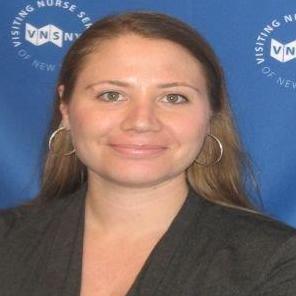 “My goal is to return chronically ill patients to the community and their homes with whatever support they may need.”
“My goal is to return chronically ill patients to the community and their homes with whatever support they may need.”
Corinne McNally, Care Assessment Manager, VNSNY CHOICE
“I conduct assessments for chronically ill plan members who are being discharged from the hospital or nursing home. My goal is to keep these chronically ill members in their own homes with additional necessary support and services, such as additional equipment and physical or occupational therapy. I really enjoy working with people in their homes. I get to spend time with them and see how they live and interact with family members, so I really get to know what’s going on with their lives. Being in their homes also allows me to identify dangers: One recent patient, for instance, had throw rugs all over the floor, which are a trip hazard. I love being a positive part of their day—educating them about preventive care and how to monitor their health, which is critical. A lot of these people are alone for much of the day, so in a way I also function as a friend. It does get a little sad sometimes when patients have worsening dementia or debilitating diseases, but you just have to do the best you can and know that you are helping. If I allowed myself to get overwhelmed, how could I be good at my job?”
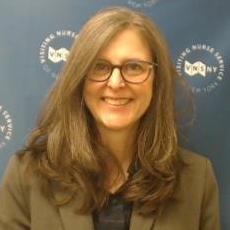 “Being a hospice nurse is the most rewarding nursing job I’ve ever had.”
“Being a hospice nurse is the most rewarding nursing job I’ve ever had.”
Ellen Eylers, Admission Nurse, VNSNY Hospice & Palliative Care
“Despite all the obvious difficulties around the sensitive nature of hospice, being a hospice nurse is the most rewarding nursing job I’ve ever had. My job offers a great opportunity to be extremely open and compassionate with people who are going through a very hard time. The patients and families that we’re dealing with are in such a delicate place, with such overwhelming stress and really facing an awful amount of suffering, that I consider it an honor to be allowed into that space. I visit them at home to explain hospice, answer their questions and address any misconceptions they may have. I help them transition to that next phase, and get the ball rolling for their care. People are very grateful just to have somebody who is listening and being patient and trying to meet their needs. Many of them have grown accustomed to health care that might have seemed disjointed or maybe even felt a little brutal along the way. In hospice, we have a very different philosophy: It’s all about being calming and comforting, and about managing symptoms at home.”
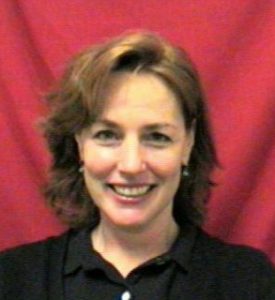 “I’m here to offer support and education, and to keep our MLTC plan members as healthy and functional as possible at home.”
“I’m here to offer support and education, and to keep our MLTC plan members as healthy and functional as possible at home.”
Janine Ranieri, Nurse Care Coordinator, VNSNY CHOICE MLTC
“As a nurse care coordinator and care manager for the CHOICE MLTC transitional care team, my job is to prevent re-hospitalizations of our MLTC members after they’re discharged. I work from an office now, but as a registered nurse and a nurse practitioner I still use my skills and expertise to figure out what exactly caused them to be hospitalized in the first place and how to keep their recovery on track. I have 40 to 50 patients that I’m responsible for. I call each one of them once a month to check in, but they also call me all the time. I’m here to offer support and education, and to keep our MLTC plan members as healthy and functional as possible at home by coordinating everything from their physical therapy to the delivery of their medication blister packs. A lot can be done over the phone. I feel like I know my patients. I even have a visual image of each one that I form just by hearing their voice. I also pick up on cues when we’re talking—if they’re out of breath, for example, or their voice sounds weakened from dehydration, or they’re just not as spirited as the last time we spoke. I also rely quite a bit on the excellent home health aides who provide day-to-day care for our members. They’re my eyes and ears in the field, and they really provide valuable perspective.”
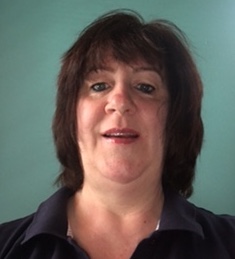 “I try to make life as easy for my patients as I can.”
“I try to make life as easy for my patients as I can.”
Mary Geraldine McAleer, VNSNY Home Care Nurse, Queens Region
“My job is always evolving! There is always something new—it keeps me on my toes. I’ve been with VNSNY 15 years, and before that I had all kinds of nursing jobs. I first got into home care nursing because of the flexible schedule. Back in the day, I needed a job that would accommodate my taking my kids to school in the morning. I still love working in the home setting because I get to spend one-on-one time with my patients and their families without the stress of a hospital setting. I try to make life as easy for my patients as I can. I have had patients who were so brave—they came from other states to have their surgery with no support. I remember a couple of patients I cared for a few years ago, two women who were staying at the YMCA and were in need of things most of us take for granted, basic food, things like that. They had nobody there to provide for them. It was a very sad situation, and I hope I was able to bring them comfort. One growing patient population of mine is postoperative transgender patients. They get assigned to me because I took a special course in how to provide care for these patients. It’s a community that is often stigmatized, and many of the patients are unsure whether nurses are going to accept their choices. Many have struggled all of their lives, and will continue to do so. Fortunately, they soon understand that I have compassion for their struggle.”
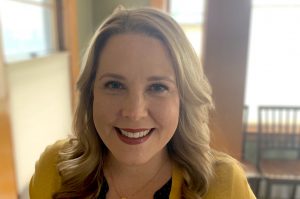 “What I love the most about my job is my relationship with my patients.”
“What I love the most about my job is my relationship with my patients.”
Lisa Magliente, Registered Nurse Field Supervisor, Partners in Care
“As a nurse field supervisor, I do initial assessments of new clients in the home and then conduct follow-up visits at six-month intervals (for MLTC patients) or 60-day intervals (for private-pay patients) to make sure that the patients are thriving, have what they need, and are safe. I also keep an open dialogue going with their home health aides, many of whom have been with the same patients for years. I support the aides and have a lot of respect for them. They have a tough job, and are a valuable part of the team—they’re there in the patient’s home every day, and are often the ones who alert us to changes in a patient’s health status. I think that home health aides as a key part of the care team are the wave of the future, since people don’t stay in the hospital for long stretches anymore. What I love the most about my job is my relationship with my patients, whom I really do get to know. Sometimes there’s a misconception that if you’re not doing hands-on, bedside nursing every day you’ll lose your skills. I use my nursing knowledge every day in my supervisory role. I also believe that communication is one of the biggest and most important nursing skills—and it’s a skill I use all the time. I hope that people realize how much we do help—even if we’re not always inserting Foley catheters!”
Also for Nurses Week: Click here to read “I Am a Visiting Nurse,” a poem by Connie Evans, field nurse with VNSNY Home Care’s Manhattan region!
